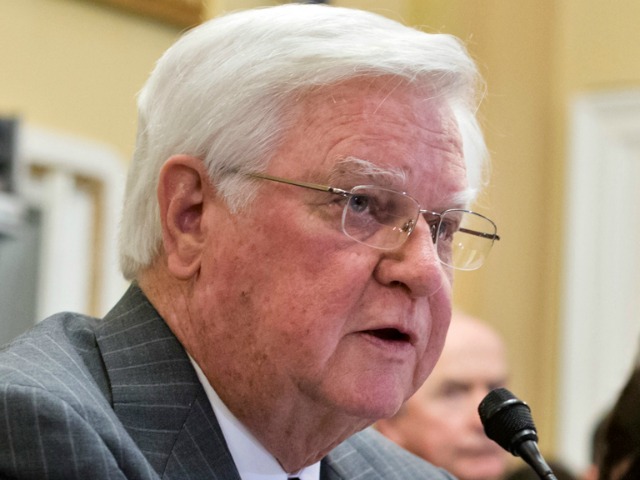The chairman of the House Appropriations Committee pitched GOP colleagues on a plan to rescind funding for targeted programs in the next Congress to respond to President Obama’s planned executive amnesty, throwing a new idea into a ring already full of them.
“Chairman Rogers just got up and said if we pass an omnibus and then the president does this executive amnesty, he said we can rescind it, and we can rescind it with 218 and 51 and we don’t need the president. That’s what he just told me. I’ve never heard that before,” said Rep. Matt Salmon (R-AZ), a key conservative lawmaker who has emerged as a leader in crafting strategy on the issue.
The idea startled GOP members who, according to Salmon, hadn’t contemplated the strategy until now. And Rogers had difficulty explaining the idea to a scrum of reporters given that the last time it was used was the 1990s. “I don’t think any of you have ever seen a rescission bill!” Rogers said.
“There’s any number of possibilities including rescission of spending after the fact. One of the difficulties we’re having is we really don’t know what actions he plans to actually take. When Livingston took over as chairman, he proposed and passed rescissions of spending bills that after the fact took away money that had been appropriated for an agency,” Rogers added.
Speaker John Boehner and the House GOP leadership team told Republicans that no decisions had been made, and several lawmakers said a wide range of ideas – as many as 15, according to one – were discussed.
Broadly speaking, however, the GOP is united in its desire to stop Obama from issuing amnesty unilaterally.
“I think it’s unconstitutional,” said Rep. Jeff Denham (R-CA), the first Republican to cosponsor the House Democrats’ comprehensive immigration bill in 2013, about Obama’s pending executive actions.
“We’re going to combat it with everything that we have, that’s in us. We’re not going to take it lying down. We’re very thoughtfully reviewing all the options now in front of us,” said Rep. Michele Bachmann (R-MN).
Many Republicans are pushing to punt significant legislative action, including an omnibus spending bill, until the next Congress, when the GOP will have more leverage and control, given their control of the upper chamber.
“I’m open-minded. But I’m more inclined towards doing as little as we can at a time when we’re weak and wait to do as much as we can when we have the Senate,” said Rep. Dana Rohrabacher (R-CA).
But members of the appropriations panel are still making a big push to get the mammoth spending bill through in the waning days of the 113th.
“We have to put all our efforts toward an omnibus,” said Rep. Kay Granger (R-TX). “A continuing resolution says the world is exactly like it was last year, and no one believes that.”
A leading argument put forward by opponents of a preemptive strike on Obama’s ability to legalize illegal aliens on his own is that the exact details of his action are unknown.
“A lot of people are getting out front, it’s a little too early for that,” said Rep. Devin Nunes (R-CA), a key ally of Boehner’s. “I don’t know that funding has anything to do with what he’s going to do yet.”
Yet another idea is for Congress to focus on stopping Obama through the courts.
“Yesterday I filed a bill that would allow the House leadership to seek declaratory judgment action, preliminary injunction, other injunctive relief, writ of mandamus to force the president to obey immigration law. That’s the path I prefer,” said Rep. Mo Brooks (R-AL).
At a press conference following the meeting, House Majority Leader Kevin McCarthy said Obama should allow time for a Republican Congress to pass its own immigration bill.
“The one thing I will say is the president had two years with the House and Senate and did nothing on immigration. But he wont even tallow this new American congress to convene before we have an opportunity to do something about it. I think he should rethink that opportunity,” he said.
Caroline May contributed reporting.

COMMENTS
Please let us know if you're having issues with commenting.